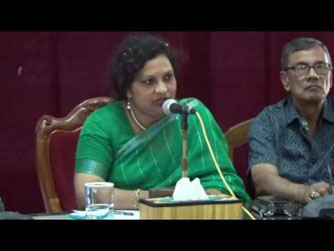By Syed Altefat Hossain
DHAKA, June 29, 2019 (BSS) – The Gender Budget has been gearing up women empowerment in country’s different sectors, including politics, economy, education and health, since its inception in fiscal 2009-10 as the government stresses consideration of gender sensitivity in adoption and implementation of any policy-strategy.
“Significant achievements in Gender Gap Index have been made thanks to consideration of gender sensitivity seriously in the formulation and execution of the government policy-strategy,” according to the Gender Budget Report 2019-20 placed in the Jatiya Sangsad on June 13.
Finance Minister AHM Mustafa Kamal presented the report in the House during placing a Taka 5,23,190 crore proposed budget for the fiscal year (FY) 2019-20.
Along with different policies and programmes, the government launched the gender-responsive budget for the implementation of the National Women Development Policy to monitor the management of financial resources and make other stakeholders accountable to the state and place a report on the gender responsive budget in parliament every year.
According to the Gender Budget Report 2019-20, Taka 1,61,247 crore, which is 30.82 percent of the total budget and 5.56 percent of the GDP, has been allocated for gender development in the national budget for FY 2019-20, while the amount was Taka 27,248 crore in 2009-10.
The allocation for the women budget was Taka 1,37,742 crore in FY 2018-19, which indicated that on an average, annual allocation has increased by 22 percent till FY 2018-19 from 2009-10.
For the first time, the government placed a gender budget report of four ministries in parliament in FY 2009-10 contacting analysis of policies and strategies for advancement of women, major achievements for uplifting women’s rights and allocation for women development etc.
A total of 43 ministries/divisions, however, have been come under the gender budget report in FY 2019-20.
Quoting the Global Gender Gap Report 2018, the Gender Budget Report 2019-20 revealed that the progress of women in Bangladesh rose to 72.1 percent in 2018 from 62.7 percent in 2006, which is above the global average.
“Bangladesh has been ranked 48th among 149 countries in 2018 which was 91st among 115 countries in 2006,” it said.
The report said that the level of equality among the men and women has been increased from 42.3 percent to 44.1 percent in economy, 86.8 percent to 95.0 percent in education, 95.0 percent to 96.9 percent in health and 26.6 percent to 52.6 percent in politics till 2018 since the inception of the Gender Gap Index in 2006.
Besides, as per the Global Gender Gap Report 2018 published by the World Economic Forum (WEF), Bangladesh has held its topmost position among the countries of South Asia in gender equality for the fourth time in a row with the rank 48th among the 149 nations.
In the index, Bangladesh’s South Asian neighbours Sri Lanka ranked 100th, Nepal 105th, India 108th, the Maldives 113th, Bhutan ranked 122nd, while Pakistan was at the bottom, ranked 148th.
The Gender Budget Report said, “Globally there is still a significant gender gap. There is overall 77.1 percent gender gap in political empowerment and 41.9 percent in economic empowerment globally. (But) it is a matter of pride that the progress of Bangladesh in women’s political empowerment is very satisfactory”.
Bangladesh secured 5th position in political women’s empowerment among the 149 countries in 2018 and the level of existing discrimination is 47 percent, which is much lower than the global average of 68 percent, the report added.
Speaking about Gender Budget’s role in women development, Executive Director of Steps Towards Development Ranjan Karmakar said gender budget is playing a big role in implementing the women development policy, empowering women through education, creating small women entrepreneurs and reducing infant and maternity mortality rate.
The government is increasing the allocation for the gender budget every year considering the women’s growing demands, he said, adding that without recognizing women’s economic and political empowerment and their contribution, it is impossible to turn the country into a middle income one.
To ensure overall women empowerment, Karmakar emphasized changing outlook of the state, institutions and individuals towards women and procuring women-friendly technologies.
“If the government fails to change the outlook, violence against women will go up and the womenfolk cannot contribute to the society as per their capacity,” he said.



